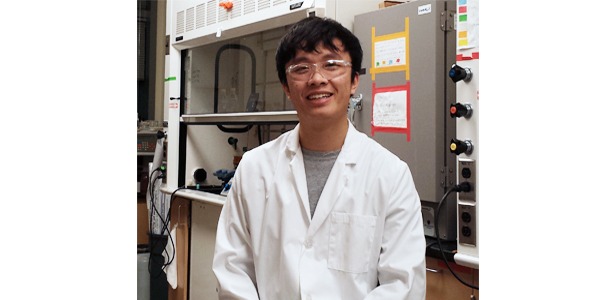When it comes to cancer, the brain tumor glioblastoma is particularly deadly. It is often aggressive, and its tendrils infiltrate surrounding tissue. Currently available post-surgery treatments generally fail to extend patient lives, resulting in a median overall survival of 12 to 14 months and a 2-year survival rate of 15 to 26 percent. Now, researchers led by Suzie Pun, the Robert F. Rushmer Associate Professor of Bioengineering at the University of Washington, are developing a promising drug-delivery technique that targets the challenging tumor.
One of those researchers, undergraduate Ngoc-Anh Ta, who goes by Anh, is helping to develop a biodegradable hydrogel to deliver peptides, or specific amino-acid sequences, and endostatin, a cancer-suppressing protein, inside the glioblastoma cells. The polymer hydrogel is designed to break down over time, releasing its lethal drug dose to the brain cancer cell where it takes up residence.
“Hopefully a hydrogel will provide a sustained and localized drug release system to kill remaining tumor cells after surgery,” Anh said.
One of the tricks was breaking the hydrogel into small enough pieces to allow the cancer cells to take it in. Anh helped to create and validate a specific cross-linker, a chemical bond that links one polymer chain to another. Once the polymer reaches the tumor, the cross-linker slowly breaks up the polymer and releases its fatal cargo into the cancer cells. The cross-linker is designed to degrade in a way that targets only the cancer cells, and limits damage to healthy cells. Thanks to the endostatin, this all-in-one drug delivery system also chokes off blood and nutrient supply to cancer cells and prevents new blood vessels from forming.
Embracing challenges
In addition to contributing to the synthesis and validation of a cross-linker for the drug delivery hydrogel, 19-year-old Anh, a senior, has become a published author on his first research paper – on DNA transfection. He has presented his research findings at a symposium, and earned a number of scholarships. “Whenever I read about research now, I appreciate it – I know the hard work that goes into it,” he says.
Indeed, Anh embraces challenges. Rather than beginning his junior year in high school, at age 16 Anh gained early admittance to the University of Washington through the UW Academy, a program for a small group of academically advanced, highly motivated high school students.
Anh enjoys diagnosing what’s wrong and changing conditions to optimize a system, but what really motivates him is making a contribution to others. “I hope to be able to contribute to something that’s lasting, to be part of the community, to make a difference in the world and to help people,” Anh said.
After graduation, Anh plans to apply his love of drug design and medicine to helping others more directly. He plans to earn an MD or an MD/PhD, and specialize in pediatric oncology. With his combined degrees, he hopes to lead a lab in discovering and designing new drugs for effective cancer treatment and conducting clinical trials.
“Without the strong research and critical thinking skills developed by UW Bioengineering, there is not a chance that I would even consider pursuing these goals,” Anh wrote in a scholarship essay.
“I want to work with kids because they are the patients with the most to lose from cancer, and also the patients with the most to gain from an effective treatment,” Anh said. He already has experience working with children and knows he enjoys relating to them– for three years he has taught youth classes to 8-12-year-olds at his church.
Becoming part of the campus community
In addition to being a Mary Gates Scholar, a NASA Summer Undergraduate Research Program scholar and a Washington State Opportunity Scholar, this fall Anh was named the Department of Bioengineering’s first Stratos-Stephan scholar. The new Stratos-Stephan Endowed Fund for Education supports activities specifically related to molecular engineering, including student scholarships and fellowships.
For the past three years, Anh commuted by bus for two-three hours from Renton each day, which made it hard to maintain time-sensitive experiments in the lab, to study and to connect with his peers. This year, however, thanks to his scholarships, he is able to live on campus. “I’m able to be part of the UW community now,” Anh said. “I can check in on my research in the lab regularly, and I have more time for studying.” The scholarships have transformed his world.
“I think anytime you can make it easier for a student to do their best at educating themselves and not have to spend time earning tuition, the better off we all are,” said Harold Kawaguchi, chairman of Stratos Group, based in Seattle. “The hope obviously is that those students go on to solve life’s problems,” he added. Anh appears to be well on his way toward fulfilling that hope.
“I have received an incredible amount of support,” Anh said, acknowledging his graduate student mentors in the Pun lab, his family and the scholarships. “It’s not just me accomplishing this. None of it would be possible without everyone helping me.”
To learn more about undergraduate scholarships and how you can support students like Anh, visit our Giving page.


